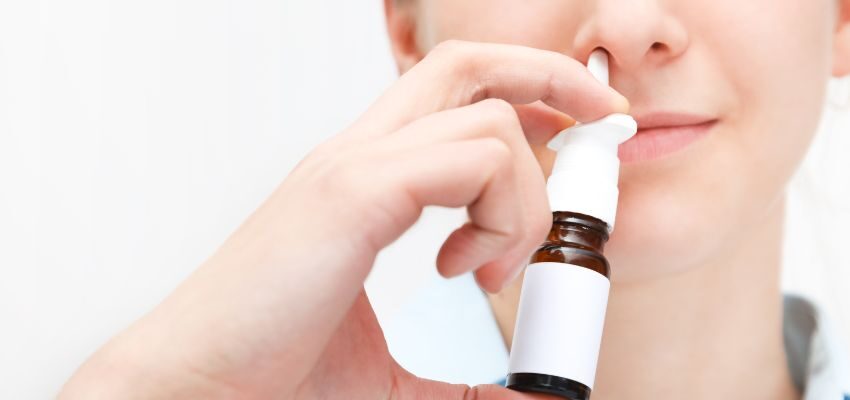Does Hydrogen Peroxide Work For Sinus Infections?

Published May 16, 2025
Are you struggling with sinus infections that won’t go away? Constant congestion and facial pain can seriously impact your daily life. Decongestants and saline rinses are popular remedies. However, a new option is gaining attention: hydrogen peroxide. However, is it possible to put hydrogen peroxide in your nose? This household antiseptic is known for killing germs. It’s now being considered as a potential way to relieve sinus symptoms.
In this article, we’ll explore if it’s possible to put hydrogen peroxide in your nose to ease sinus infection symptoms.
Can You Put Hydrogen Peroxide In Your Nose For Sinus Infections?
When used properly, hydrogen peroxide can help manage sinus infections. Its antiseptic and antibacterial properties clear bacteria and ease congestion. However, use caution when applying it to sensitive areas like the nasal passages.
For nasal irritation, a standard recommendation is to dilute 3% hydrogen peroxide with water at a ratio of one part peroxide to four parts water. This dilution reduces the risk of irritating or damaging the delicate mucosal lining.
Some people find relief from sinus symptoms with hydrogen peroxide. However, improper use can cause burning, irritation, or other issues. Always dilute it properly and avoid overuse. To stay safe, consult a healthcare professional before adding it to your sinus care routine.
Understanding Sinus Infections
Sinus infections develop when the sinus cavities become inflamed and swollen, obstructing the natural drainage of mucus. This blockage can cause discomfort and, if left untreated, may lead to complications.
Sinus infections typically stem from the following causes:
- Viral infections: Colds and flu viruses often cause sinus infections. They trigger inflammation in the sinus passages.
- Bacterial infections: Trapped mucus in swollen sinuses can cause problems. It creates the perfect environment for bacteria. This often leads to bacterial sinus infections.
- Allergies: Allergic reactions to dust, pollen, or pet dander can inflame the sinuses. This inflammation makes them more prone to infection.
Common Symptoms And Possible Complications
Sinusitis symptoms include nasal congestion, facial pain or pressure, and mucus discharge. Sometimes, it causes a low-grade fever. Without treatment, it can lead to chronic sinusitis or spread to other areas, resulting in ongoing discomfort. Timely and effective care is crucial to prevent these complications and restore comfort.
What Is Hydrogen Peroxide?
Hydrogen peroxide is a versatile compound known for its disinfectant and antiseptic properties. It’s a clear liquid that reacts with organic material. When it releases oxygen, it kills bacteria and prevents their growth.
It’s a powerful oxidizer used to clean wounds, whiten teeth, and rinse mouths. Its antibacterial properties may help with sinus infections, which is why it’s a household staple for many.

Using Hydrogen Peroxide For Sinus Infections
Hydrogen peroxide can support sinus health when used correctly, but proper dilution is crucial for safety. The recommended ratio is 1 part 3% hydrogen peroxide to 4 parts filtered water. Once prepared, you can use this solution in two ways:
Nasal spray
- Fill a clean nasal spray bottle with the diluted solution.
- Gently spray into each nostril to allow the solution to reach the sinus cavities.
- Follow your healthcare provider’s recommendations for frequency.
Nasal flush
- Lean over a sink and tilt your head slightly to one side.
- Use a bulb syringe or neti pot to introduce the diluted solution into one nostril.
- Let it flow out of the other nostril, flushing out mucus and debris.
- Repeat on the opposite side, then gently blow your nose.
Potential Benefits Of Using Hydrogen Peroxide
When used as directed, hydrogen peroxide offers several potential benefits for sinus care:
- Clears nasal congestion by flushing out mucus and debris.
- Fight bacteria with its natural antibacterial properties, addressing the root cause of many sinus infections.
- Reduces reinfection risk by maintaining clean, clear nasal passages.
- Affordable and accessible, as hydrogen peroxide is inexpensive and widely available.
- Non-addictive, making it a safer alternative to steroid-based nasal sprays for long-term use when approved by a professional.
Safety Guidelines
While hydrogen peroxide can be helpful, it’s essential to use it responsibly to avoid complications:
- Always dilute hydrogen peroxide to prevent irritation or damage to the sensitive nasal lining.
- Never use concentrated or undiluted hydrogen peroxide, which can cause severe burns or irritation.
- Be aware of side effects like mild burning, nasal irritation, or, in rare cases, complications such as gas embolism if misused.
- Consult a healthcare provider before using hydrogen peroxide. This is especially important if you have chronic sinus issues or other conditions.
Natural Alternatives To Hydrogen Peroxide For Nasal Health
If you’re looking for alternatives to hydrogen peroxide for nasal care, here are some effective and gentle options to consider:
- Saline solutions. Saline solutions are an easy and reliable way to irrigate your nose. They flush out mucus and allergens and soothe your nasal passages.
- Steam inhalation. Steam helps moisturize dry nasal passages, ease congestion, and provide relief. It’s useful during colds or allergies.
- Neti pots. Neti pots are made for nasal irrigation. They work with saline solutions to clear nasal passages. This helps improve breathing.
- Probiotics. Probiotics help maintain a balanced microbiome, which supports a stronger immune system. They also naturally promote better sinus health. Bionaze, a probiotic supplement for ear, nose, and throat (ENT) health, contains Streptococcus salivarius K12 (BLIS K12) and Bifidobacterium lactis (BL-04). These strains help balance the oral and nasal microbiome, reducing sinus infections and boosting immune response.
Frequently Asked Questions
What is the recommended dilution ratio?
The standard recommendation is to dilute 1 part 3% hydrogen peroxide with four parts filtered water.
How often can hydrogen peroxide be used in the nose?
The frequency of use depends on the severity of your condition. In most cases, a few times per week is suggested. However, it’s crucial to see a healthcare professional for tailored guidance.
Can hydrogen peroxide cause irritation?
Yes, improper dilution or excessive use can lead to nasal irritation, a burning sensation, or even more severe side effects. Always follow recommended guidelines to minimize risks.
Are there commercial products available?
Yes, pre-diluted hydrogen peroxide nasal sprays offer a convenient and safer alternative.

Why Choose Bionaze?
Bionaze is a specially crafted probiotic supplement designed to support the health of your ears, nose, and throat (ENT). Its unique formula features two clinically researched probiotic strains:
- Streptococcus salivarius K12 (BLIS K12) – A patented strain renowned for protecting the throat and oral cavity by outcompeting harmful bacteria.
- Bifidobacterium lactis (BL-04) – A beneficial probiotic that helps maintain a healthy bacterial balance in the nasal and respiratory passages.
By nurturing a balanced microbiome in both the mouth and sinuses, Bionaze helps reduce inflammation, prevent recurring sinus infections, and strengthen your immune system. It’s a natural, effective way to elevate your sinus care routine, especially when paired with methods like nasal rinses or steam inhalation.
Is It Safe To Put Hydrogen Peroxide In Your Nose?
Can you put hydrogen peroxide in your nose? Hydrogen peroxide may help manage sinus infections. It has antibacterial properties and can relieve congestion. However, it must be appropriately diluted to avoid risks. While it may work, safer options are available. Saline rinses, steam inhalation, and neti pots are gentler and more reliable alternatives. It’s essential to consult a healthcare professional before starting any new treatment for sinus infections.
Looking for a natural way to support your sinus and ENT health? Try Bionaze, a probiotic with clinically backed strains for nasal and oral health. It may help reduce sinus infections and strengthen your immune system. Learn more at bionaze.com.
Benefit From The Latest Advancements In Probiotic Science With Bionaze
Bionaze is a proprietary blend of probiotics proven to promote ear, nose, and throat health, improve digestion, and support your immune system. The active ingredients BLIS K12, and BL-04 are considered among the best probiotics according to science.
Get 25% Off Your First Order when you use BIO25 at checkout!

This Content Has Been Reviewed For Factual Accuracy
This content has undergone thorough fact-checking by our team of internal experts. Learn more about the meticulous editorial standard for our website here.
ADVERTISEMENT

About The Author
Hi, I’m Corinne Grace, a proud nursing graduate from Riverside College with a flair for writing. I specialize in health and wellness topics, using my educational background to weave informative and attention-grabbing articles that appeal to a wide variety of readers.




